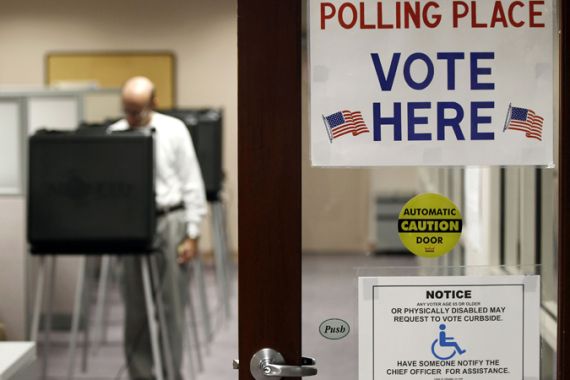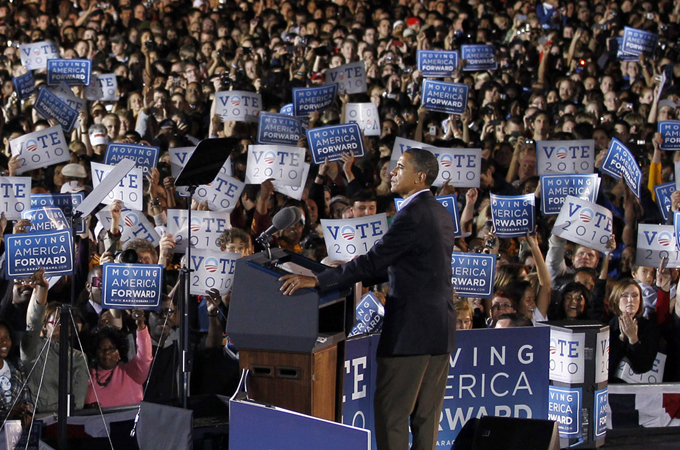Primer: US midterms at a glance
This year could be a wave election – a mandate for change where the party in power is swept away by the opposition.

 |
| President Barack Obama’s party faces major hurdles in the upcoming midterm elections [REUTERS] |
The Midterm elections on November 2 will be the first nationwide referendum on the Obama administration.
The old adage that all politics is local doesn’t seem to apply this year. Instead, all politics is national.
Americans lack trust in the institutions of government and the President. An NBC/WSJ poll released on October 19 found 69% of those polled said their vote is a signal to President Barack Obama.
Just 35% of them said their vote is in support of him, while 34% said their vote is against him.
While Obama isn’t on the ballot anywhere, he’s really on the ballot everywhere.
But if Republicans win control of the House and/or Senate, Obama gains a foe. He’ll be able to blame the Republican majority for the nation’s problems. He’ll have something to campaign against in 2012. If the electorate continues to be so hyperpolarized, their anger could easily transfer back to the Republican Party.
Republicans on the other hand, will want to make a contrast with Obama to help their potential Presidential candidates in 2012. No one has yet emerged as a national leader of the Republican Party or a uniter of the Tea Party, old school, and socially conservative factions.
Election overview
All 435 seats in the House of Representatives are up for election. There are 255 Democrats, 178 Republicans and 2 vacancies.
Thirty-seven out of 100 Senate seats are being contested. Democrats currently have a 59-41 majority. Thirty-seven Governor’s offices are also being contested.
High unemployment, the growing deficit, and widespread public anger with Washington could mean deep loses for Democrats in Congress. It’s likely they’ll lose the Majority in the House of Representatives – the question is by how much. Republicans have to net 39 seats to win control of the lower chamber.
In the Senate however, the hurdle of regaining the majority is much higher. Republicans would have to pick up 10 seats. Three Democratic held seats are certainly lost – North Dakota, Indiana, and Arkansas. But Republicans would have to win almost every single hotly contested seat in order to become the majority party.
Currently, it seems likely that Republicans will pick up 5-7 seats in the Senate.
Hot-button issues
By far the biggest issue in this election is the weak economy and persistently high unemployment. According to a Bloomberg National Poll from the beginning of October, 49% of likely voters said unemployment is the most important issue facing the nation.
Spending and the deficit rank at 27%. Healthcare polls a distant third at 10%. As for the war in Afghanistan, only 7% say it’s the most important issue.
Jobs, jobs, jobs. The White House made a critical error in its first month in office. Administration officials claimed the stimulus would keep unemployment at 8%. The current unemployment rate is 9.6%. The public sees a promise not kept. Republicans see an opportunity.
Wave election
All signs indicate this could be a wave election. A wave election is a mandate for change where the party in power is swept out of office in a tide of opposition. Analysts compare this election to other recent waves, particularly 1994.
Fifty-four Democrats lost in the House that year, a huge blow to then-President Bill Clinton, whose unpopular healthcare reform proposal was largely responsible for the wave. In 1994, 58% of those polled by the Pew Research Center wanted to see their representative reelected. This year, only 47% want to give their member of Congress another term.
The electorate is hyperpolarized. An AP/Gfk poll out on October 21st found 59% of Americans felt the country is headed in the wrong direction. The Democrats are depressed about voting, while Republicans are outraged at perceived government overreach and plan to cast a protest vote against the establishment. The difference between malaise and excitement has been dubbed the “enthusiasm gap.”
As for the all important independent voter courted by both parties (38% of the electorate, according to Pew), a poll released this week by Politico/George Washington University found Republicans hold a 14-point advantage with independents. They broke for Obama in 2008.
Historically, the president’s party loses seats in the Midterms – since WWII, an average of 24-25 seats in the House and four seats in the Senate. Americans are generally suspicious of government and prefer checks and balances
between the parties, never letting one party get too much control of government. Divided government is the norm in modern US politics.
Turnout in Midterm Elections is lower than in Presidential Election years. In 2008, 64% of those eligible voted, while in 2006, 48% voted. The Midterm electorate tends to be older, wealthier, and better educated than the Presidential electorate. Also, historically, fewer minorities turn out. Midterms usually only attract the committed voter.
Campaign finance
The changing dynamic of money in politics is one of the most significant consequences of this cycle. This is the first election since the January Supreme Court ruling that overturned 100 years of limits on corporate campaign spending. Now corporations can give money to directly influence the races.
While campaign finance laws in the US have been chipped away for years by the courts, this election cycle has already proved that the only thing recession-proof is campaign spending.
The Wesleyan Media Project estimates as of mid-October, $367 million has been spent on advertising for the House and Senate races since January 1.
Whether an all-out push by President Obama in the last days of the campaign will be able to hold back the Republican wave depends on whether he can rally the base.
But it’s a sign of weakness if in the final days before the election he’s still trying to convince the people who have supported him in the past to give his Democratic allies another chance.
